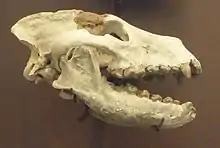Aelurodon
Aelurodon is an extinct canid genus of the subfamily Borophaginae which lived from the Barstovian land mammal age (16 mya) of the middle Miocene to the late Miocene epoch (5.332 mya).[2][3] Aelurodon existed for approximately 10.7 million years.
| Aelurodon | |
|---|---|
 | |
| Skull of Aelurodon taxoides | |
| Scientific classification | |
| Domain: | Eukaryota |
| Kingdom: | Animalia |
| Phylum: | Chordata |
| Class: | Mammalia |
| Order: | Carnivora |
| Family: | Canidae |
| Subfamily: | †Borophaginae |
| Tribe: | †Borophagini |
| Subtribe: | †Aelurodontina |
| Genus: | †Aelurodon Leidy, 1858 |
| Type species | |
| †Aelurodon ferox | |
| Species[1][2] | |
| |
| Synonyms | |
| |
Description
Aelurodon are a part of a clade of canids loosely known as "bone-crushing" or "hyena-like" dogs, that apparently descended from the earlier genera Protomarctus and Tomarctus.[2] Several species are known from fossils found in the central and western U.S., suggesting a wide geographic range during their peak in the Miocene epoch.[4][2] Large species of Aelurodon (A. ferox and A. taxoides) may have hunted in packs like modern wolves.[5]
The evolution of Aelurodon is characterized by the progressive development of teeth adapted to a more hypercarnivorous diet, a trend consistent with other borophagines.[2] The earliest occurrence of the genus is A. asthenostylus dating from 16–14 Ma. This species then gives rise to two different anagenetic clades around 15 Ma. One comprises the species A. montaneis, A. mcgrewi and A. stirtoni, going extinct around 12 Ma. The other clade persists until 5.3 Ma and includes A. ferox and A. taxoides. A. taxoides is the most derived and largest species in Aelurodon.[1][2]
References
- Wang, Xiaoming; Richard Tedford; Beryl Taylor (1999-11-17). "Phylogenetic systematics of the Borophaginae" (PDF). Bulletin of the American Museum of Natural History. 243: 1–391. hdl:2246/1588. Archived from the original (PDF) on March 20, 2007. Retrieved 2007-07-08.
- Wang, Xiaoming; Benjamin Wideman; Ralph Nichols; Debra Hanneman (June 2004). "A new species of Aelurodon (Carnivora, Canidae) from the Barstovian of Montana" (PDF). Journal of Vertebrate Paleontology. 24 (2): 445–452. doi:10.1671/2493. S2CID 21694500. Archived from the original (PDF) on December 16, 2008. Retrieved 2015-04-14.
- Aelurodon, Age Range and Collections, PaleoBiology Database yu
- "Vertebrates; Mammalia; Carnivora; Canidae; Aelurodon". Archived from the original on 2011-07-18. Retrieved 2006-04-12. List of Aelurodon specimens from the Berkeley Natural History Museum. (Accessed 4/11/06)
- Van Valkenburgh, B.; Sacco, T.; Wang, X. (2003). "Pack hunting in Miocene borophagine dogs: evidence from craniodental morphology and body size" (PDF). Bulletin of the American Museum of Natural History. 279: 147–162. doi:10.1206/0003-0090(2003)279<0147:C>2.0.CO;2. Archived from the original (PDF) on 2008-09-20. Retrieved 2008-05-02.
Further reading
- Xiaoming Wang, Richard H. Tedford, Mauricio Antón, Dogs: Their Fossil Relatives and Evolutionary History, New York : Columbia University Press, 2008; ISBN 978-0-231-13528-3